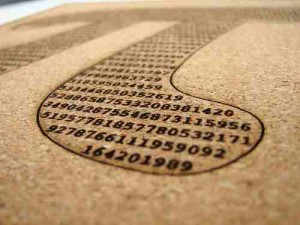… or so it would seem. Numbers can be confusing. I can attest to my own experience in high school that math class was nothing short of bewildering and belittling. Many people struggle with the language of math and can develop a strong aversion to it in their adult life. There are, however, an almost infinite variety of other math languages that exist out there, some of them more attuned to the basic instincts we inherit as humans. Even alternate forms of our math system have been developed and used over the ages. Pi is for Pi is an exploration into these ‘intuitive mathematics’ and the origins of our current system. By engaging in interviews, reading texts by and about ‘mathematicians’, listening to radio explorations of the subject, and participating in a Calculated Poetics workshop as a part of the joint endeavor of the As Poetry Recycles Neurons and Methods of Mathematical Physics programs, I hope to discover the ethnomathematic origins of instinctual math and develop methods of teaching it, using core examples from various systems to relay the capabilities that lie hidden within my peers, who tragically may also have been afflicted by the current mathematical education model, recycling their neurons to do math with fun and confidence once again!
Supporting materials include Number Sense by Stanislaus Dehaene, The Magic Mirror of M.C. Escher by Bruno Hurst, Leonardo’s Notebooks edited by H. Anna Suh, The Fractal Geometry of Nature by Benoit Mandelbrot, an interview with Tim Morrissey at the Waldorf Schools Olympia, weekly readings for Calculated Poetics workshop, the Radiolab episode Numbers, and possible interviews with the faculty Bill Arney, Sunshine Campbell, Vaughn Graham, Anita Lenges, and Sherry Walton at The Evergreen State College. others TBA
Weekly log and Field notes
- Pi week 7 log May 22, 2013 April 12th – 18th 8 hours – reading Neuro , The Magic Mirror of M.C. Escher, Dali, The Fractal Geometry of Nature, The Notebooks of Leornardo 2 1/2 hours – watching From Zero to Infinity: A ...
- Pi week 6 log May 14, 2013 May 5th – 11th 5 hours – reading Number Sense by Stanislaus Dehaene, Dali by Robert Descharnes 3 hours – video; The Dali Dimension by Joan Ubeda et. al, and Zero to Infinity: A History of Numbers by ...
- Pi week 5 log May 13, 2013 April 28th – May 4th 4 hours – reading Number Sense by Stanislaus Dehaene and Doing Goethean Science by Craig Holdrege, The Measure and Construction of the Japanese House by Heino Engel 1 hour – researching the abacus ...
- Pi week 4 log April 30, 2013 Apr 21 – 27 3 hours – collecting resources and materials and programming eAlphabet page 4 hourse – Calculated Poetics 4 hours – reading Magic Mirror of M.C. Escher, Fractal Geometry of Nature, 4 hours ...
Bachelardian Reverie
Poetry
- Pi Calculated Poetics week 5 This poem ended up being a conversation between the Sphere reading and The Fractal Geometry of Nature by Benoit Mandelbrot that I’m reading for my field study. Mandelbrot’s observations and theories were ignored for ...
- Pi Hoh Rainforest poetry week 2 – Counting fractillated rocks everywhere on the shore 1,2,3 1,2,3 1,2,3,4….5? so many rocks……
- Pi Calculated Poetics week 4 – Distance The Distance the distance between the snap of a twig and a spear throw the distance between learning language and creating meaning the distance between a child’s fingers in the palm of the ...
- Pi Calculated Poetics week 3 – Rippling Toward Infinity Rippling Toward Infinity 1 10 100 1000 1000000 1000000000 1000000000000 1000000000000000 1000000000000000000 10000000000000000000000 1000000000000000000000000000 1000000000000000000000000000000000000 10000000000000000000000000000000000000000000000 10000000000000000000000000000000000000000000000000000000000 one with zeros rippling towards infinity a splash in a pond you can count you can count more you can count the ripples in the pond a one with hollow zeros trailing behind
- Pi poetry observed – Infinite Pacifier A good friend of mine published this radio report about his friend’s experience with theoretical mathematics. It was published at Goddard College.
- Pi poetry observed – Ron Eglash-African Fractals Pi poetry observed - Ron Eglash-African Fractals
- Pi poetry observed – Radiolab-‘Numbers’ This Radiolab was the main inspiration for my field study, along with my personal experience.
- Pi poetry observed – ‘Pi-casso’ Art “Pi-casso” 16 x 17.8 in Ink print on poster paper Anonymous copyright zapbrand.com
Poetry Observed
(embedded youtube or Vimeo video will go here)
Term Paper Abstract
Read full term paper

